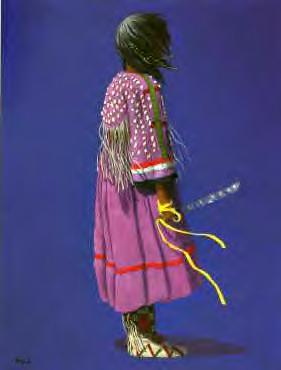|
|
Improving Ability Unlocks New Doors
by Jeanne Givens Special to The Spokesman-Review
 Residents
of the Plummer/Worley School District see a lot going right in their schools. There are solid reasons for their
optimism. Residents
of the Plummer/Worley School District see a lot going right in their schools. There are solid reasons for their
optimism.Wayne Trottier, the first Native American school superintendent, was hired recently. Joe St. John is a hard-charging, first-year principal at Lakeside Elementary. One measure of success is the dramatic rise in test scores among Indian students. After several years of lagging behind their white counterparts, Indian students can be proud of increases in their scores. Raising test scores is difficult work requiring a coordinated effort between administration, staff and teachers, said St. John. "After we received the fall test scores we sat down as a team and looked at every single child's score," he said. "We identified every child who needed intervention and provided it." Half of the students in the district are Indians. In previous years, teachers worked independently using a variety of reading approaches. Realizing students were not benefiting from that scattered approach, Superintendent George Asan streamlined into one system. Lakeside Elementary is in its third year of using the "Open Court" reading system, which includes strong phonics, fluency and comprehension components with a literature base. Classes also use the "Accelerated Reader" program, giving students a chance to practice and enhance reading skills. The new emphasis on reading is paying off. In addition to higher test scores, school library circulation is up by 400 percent. The district made a unique commitment to quality with small class sizes. In classes of 15-20 students a teacher can easily provide instruction, quickly spot learning difficulties and intervene. Academic experts have long praised smaller classes to promote quality education, especially in the lower grades of kindergarten through grade four. These grades are critical to developing strong reading skills. St. John is an energetic, "hands-on" principal. He is from Spokane and most recently was vice principal at Ponderosa Elementary in Post Falls. In seven months he's already tackled the tough issue of test performance in reading and moved on to discipline and parental involvement. An educator at heart, he team-teaches two days a week in the kindergarten class and works with a reading group of eight children. Beginning in early spring, he pitches to any child who wants to hit a ball at recess. St. John's vision of the future includes more Native American teachers as well as more male teachers. The elementary school has two Indian classroom teachers, Mark Mindt and Kay Leen Uibel. Dr. Chris Meyer, a Coeur d'Alene tribal member, is the reading specialist. Tribal elder Marlene Vant Hul is a regular visitor in the classrooms. Along with attacking low reading scores, the hiring of a Native American superintendent signaled a progressive move for the district. Wayne Trottier, a Standing Rock Sioux, will replace Asan, who is retiring. Trottier's hiring sends a positive signal to Indian teachers looking for work in rural schools on reservations. His hiring also sends a message about the importance of education in the Indian community that filters down to young people. His stature as a role model is immeasurable. The school district is bringing in the new blood in Trottier and St. John. With these changes comes a metamorphosis giving birth to new thinking and new possibilities for students. Improving a student's ability to read unlocks the door to a world that has been mostly closed to Indians. We may be on the verge of an era that will produce a new generation of Indian writers, novelists, poets, journalists and song writers. A strong foundation in reading and writing will give voice to young Indian writers for telling their own stories. With a commitment to quality, an eye toward results and inclusive leadership, schools provide the needed starting point. |
|
|
| Canku Ota is a free Newsletter celebrating Native America, its traditions and accomplishments . We do not provide subscriber or visitor names to anyone. Some articles presented in Canku Ota may contain copyright material. We have received appropriate permissions for republishing any articles. Material appearing here is distributed without profit or monetary gain to those who have expressed an interest. This is in accordance with Title 17 U.S.C. section 107. |
|
Canku Ota is a copyright of Vicki Lockard and Paul Barry. |
|